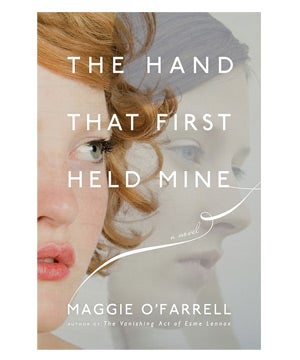The Hand That First Held Mine, By Maggie O'Farrell
A haunting tale of two London lives

Your support helps us to tell the story
From reproductive rights to climate change to Big Tech, The Independent is on the ground when the story is developing. Whether it's investigating the financials of Elon Musk's pro-Trump PAC or producing our latest documentary, 'The A Word', which shines a light on the American women fighting for reproductive rights, we know how important it is to parse out the facts from the messaging.
At such a critical moment in US history, we need reporters on the ground. Your donation allows us to keep sending journalists to speak to both sides of the story.
The Independent is trusted by Americans across the entire political spectrum. And unlike many other quality news outlets, we choose not to lock Americans out of our reporting and analysis with paywalls. We believe quality journalism should be available to everyone, paid for by those who can afford it.
Your support makes all the difference.Ever since her early novels After You'd Gone and My Lover's Lover, Maggie O'Farrell's fiction has been touched by the otherworldly. Here she exchanges the more febrile expressions of romantic love for a haunting tale of the baby blues.
Told over two time frames, The Hand That First Held Mine opens as Lexie Sinclair, a bored young graduate, runs away from home to start a new life in 1950s Soho. Taken under the wing of Innes Kent, a magazine editor 13 years her senior, she finds herself at the heart of the post-war art scene, trading witticisms with the barflies of Dean Street and discovering the pleasures of Jackson Pollock and pink gin.
In present-day London, a Finnish artist, Elina, is recovering from the difficult birth of her first child. As Elina struggles to recall the details of a botched Caesarean, her partner Ted is hit by a series of blackouts. Memories from his own childhood seem to be crowding his vision, leaving him little time to shop for baby wipes or take care of the people who need him most. Just as Elina starts to surface from her post-partum nightmare and get back to her paints, Ted takes to lying down in a darkened room.
O'Farrell is an accomplished storyteller who keeps us guessing until the end. But as is often the case, one narrative proves more compelling than the other. Although the details of Elina and Ted's fraught confinement are precisely drawn – new parents will empathise – the dynamics of their slightly chilly relationship remain a mystery.
In contrast, the cigarette-sucking sophisticates Innes and Lexie enjoy a much more robust affair. When Lexie finally moves into Innes's central London flat, the only obstacle to their happiness is the presence of Innes's aggrieved ex-wife and unhinged teenage daughter. It's their terrible revenge that underpins the novel's tragic denouement.
Vanishings, ghostly apparitions and buried secrets have long been hallmarks of O'Farrell's perennially fashionable fiction. Yet in a novel already immersed in real blood, sweat and tears, the book's more fanciful flourishes fall flat. The line between gothic and guff is thin, and O'Farrell, a writer in her prime, no longer needs the old props. This novel tears down the walls between the generations, and in an inspired upending of literary convention, places a father's post-natal ravings centre-stage.
Culture Club
Review the week's big TV show, Doctor Who.
Email your comments about the latest episodes of the BBC series to cultureclub@independent.co.uk. The best will be published here on Thursday
Join our commenting forum
Join thought-provoking conversations, follow other Independent readers and see their replies
Comments